GeneStorm: City in the Sky Read online
GeneStorm
~
City in the Sky
A novel by Paul Kidd
© Copyright 2015 Paul Kidd
[email protected]
Dedication:
For Ted: Artist, storyteller, scholar and creator. A gentleman and a true friend.
My undying thanks to my volunteer editors: Brin McLaughlin, Ian Malcolm, Tamara Carmichael and Scott Carmichael. You are Great Sages and Equals of Heaven!
Many thanks to Kalahari, for the wonderful cover art.
GeneStorm: City in the Sky
© Copyright 2015 Paul Kidd
[email protected]
This is a work of fiction. All events and characters portrayed in this book are fictitious, and any resemblance to real people or events is coincidental.
All rights reserved, including the right to reproduce this book in part or in whole in any form.
Prelude
The resort city had been a fortress, isolated in a far Australian desert and under total quarantine. Government officials and the wealthy had fled here to shelter from the GeneStorm. Nuclear demolition had created a massive line of cliffs to shield the city from the infected south. A band of lethal radiation ten kilometres deep had been seeded at the cliff base. Caught in the middle of a war, the alliance had few resources to enforce a quarantine. But engineering works had begun – the churning mass of the infected had been kept at bay.
In a single afternoon, it had all gone to hell.
Desert insects had blown in above the cliffs – contaminated foodstuff had somehow made it past quarantine. Suddenly the contagion had exploded – tens of thousands of refugees had begun to mutate, their DNA warped and poisoned by hybrid genes. Mutants thundered out into the streets slaughtering anything in their path. Every scratch, every bite, every speck of tissue contaminated more and more victims. Mutation crashed through the population like a tidal wave, leaving screaming insanity in its wake.
Wealthy refugees fled to shelter, but already there was contagion within every handful of dirt – in every insect in the skies. The city lit to the rage of plasma guns and laser fire as troops tried to hold back the mutant storm.
The city airport was already overrun. But at the sports arena, a dozen fusion powered aerodynes had been hastily gathered, sitting with jets screaming and cargo doors wide open. Military transports, passenger shuttles, VIP jets and an ambulance: every surviving aero in the city. Military units in sealed combat armour held a perimeter at the arena’s edge, while convoys of battered limousines were ushered through the lines to safety. Government officials and glitterati wearing sealed encounter suits came stumbling from the vehicles, to be hastily sprayed with decontaminant by medics. The vehicles were burned. The few refugees without suits were rammed aside, sent to huddle in desperate groups staring towards the aerodynes.
The air vehicles were great lifting bodies – fusion powered jets that could rise vertically on their engines. One sat close to a line of trucks, aircrew hurriedly loading supplies, ducking through the storm raised by the jets. Unsuited refugees nearby saw their chance and ran for the aircraft, hurtling aside a medic who tried to block their way. One of the aircrew went down under the horde, his encounter suit tearing open. A refugee seized the fallen man’s plasma pistol and fired wildly at the aircraft ramp as he ran, sending men diving into cover.
The air suddenly sheeted white: a plasma rifle sawed into the charging refugees, slicing through and through. Bolts slammed into the fallen, making certain they were dead. An armoured squad raced forward from the bleachers, plasma rifles covering the corpses: with the plague, nothing was certain, and no corpse was truly dead. The men fired more shots into the bodies – killing the aircrewman whose torn suit was already drenched in blood. Blood from the dead spattered the soil, food for ants and flies – infecting countless organisms that would go on to infect yet more. On the field, birds flopped across the paths – already infected by seeds and insects they had consumed. In the city beyond, a sudden stutter of explosions ripped through distant streets.
An officer in sealed combat armour stood beside the command aero. He scanned across half a dozen virtual displays, checking camera views from his squad leaders. Beside him, his communications sergeant fielded panicked calls from the city. He broke in across the officer’s main channel.
“Sir! Outbreak in the main refugee centre! Total infestation!”
“Can they contain?”
“They’ve breached containment! Total population loss!” The sergeant scanned the displays. “Alpha section is under fire! Armed refugees!”
The air flickered at the far end of the arena as soldiers came under fire from plasma guns and laser fire. Refugees and armed deserters were trying to rush the field and seize the last remaining aeros. Any one of the refugees could be already infected: any scratch, any mingled tissue was enough. More weapon fire spread to the east of the field as security squads opened fire on terrified crowds that suddenly charged for the arena gates. The officer flicked through channels and waved his arm to the nearest men.
“Alpha section, this is Sunray Angel! Alpha section – can you hold? Alpha section, this is Sunray Angel – do you copy?”
“Sunray Angel - this is Alpha One-One! We are under heavy fire.” The virtual image of Alpha section’s commander appeared. The sound of plasma strikes nearby was almost deafening. “They have military rifles and vehicles. Estimate thirty-plus rifles. Civilian refugees are running for our positions.”
“Alpha One-One, you will shoot anything not in an intact suit! Eliminate hostiles. HQ gun section will support.”
“Roger Sunray Angel! Out.”
It was time to get airborne. The aircraft could not waste time loitering in the air. The officer crouched by his signals sergeant and linked suit-to-suit.
“Loaded aeros are to lift off immediately! Circle north east.”
“Sir!”
The war had ravaged everything. Computer viruses had wreaked havoc with flight control systems the instant conflict had begun. Systems were being adjusted on the fly, but fusion power plants were burning out. The aeros would not last long. The task force had to use the last few precious kilometres of thrust to find a safe refuge from the plague – to consolidate and survive.
Hatches were sealed on two aerodynes packed with refugees. Soldiers signalled to the aircrew, and the vertical jets began to roar.
Radios crackled. The communications sergeant’s voice was tight with self control.
“Aero one is away! Aero two is away!”
The aerodynes lifted slowly, blasting a storm of dust outward from their jet wash, then drifted over the infected city – but slowly, all too slowly. Already the blast of small arms fire was coming closer – and the hellish screaming of mutants could be heard even above the rush of fusion jets.
Eight aeros remained on the ground – four troop transports, a civilian air ambulance and three VIP shuttles in gleaming government blue. The commander’s helmet displays danced with data as reports came crackling into his earphones.
“Mutant horde – south section!
“They’re coming through the sewers!”
The perimeter was collapsing. With mutants already breeding like wildfire in the city streets, it would be only a matter of minutes before the field was overrun. Gunfire now a constant storm, the officer ordered his men back. Refugee convoys were still coming in, fighting their way through hordes of infected citizens and mutants.
“Sir..?” The communications sergeant looked at a virtual display. “Sir!”
Horrendously mutated birds swarmed up and over the rim of the area – vile things cross-infected with insect and even squid DNA. The birds crashed into the guards, snapping and flaili
ng. The men fought back – but suddenly the rim of the arena was black with shapes. Mutating refugees were climbing the outer wall in their hundreds. They flung themselves against the soldiers in a screaming, incoherent rage.
Aerodyne chin guns span and opened fire, scorching plasma bolts across the monsters, blasting them apart. But even the mist blowing from the corpses was deadly with contagion. The entire airfield was about to become contaminated. More and more mutants were clambering across the walls – there were no longer enough men to stop them. Racing past a stumbling mass of passengers, the officer ran through the blast of dust stirred by the jets of the nearest aero, and yelled across the radio to his crews.
“All aeros – heat ‘em up! Stand by for dust off!”
A politician in an orange encounter suit whirled, utterly appalled.
“We still have government officials en route!”
“Reroute them to the space port. This position is overrun!” The military officer switched to broadcast to his entire command. “Ground sections – withdraw withdraw withdraw! All sections fall back to the aeros and immediate dust off!”
Infantry in sealed, powered suits withdrew in disciplined fire teams, firing plasma rifles in deadly streams of fire. As they pulled back into the open, the city burned. But now the sudden onrush of mutants could be seen. Things welded madly together from humans, pets, livestock and vermin flung themselves into the arena, tearing at each other in their frenzy to attack the retreating men. Gunfire cut them down in dozens – and then half a section of infantry vanished as something erupted out of the ground beneath them. Injured men screamed across the radio – already infected, already beyond help. Their comrades fled, racing towards the aerodynes.
Men fired into the onrushing mass of mutants. Suddenly an infantryman screamed. His plasma rifle exploded in his hands, blowing him apart. An aerodyne suddenly teetered in mid-air, as rifles and pistols detonated amongst the passengers. The aircraft crashed into the bleachers, breaking open in a blaze of fire.
Weapons turned white-hot then blew apart. Soldiers frenziedly threw their plasma guns away, falling back with nothing but knives and grenades. More aeros burned on the ground. At the command post, technicians could do nothing. An enemy computer virus had spread into the smart-chips on the guns.
“Virus! Virus! Discard your weapons!” The officer flinched as a pistol burst apart on the ground nearby. “Get to your ships – move!”
The first full ship raised its rear cargo door, engines running up to launch speed. Dust blasted across the ground, whipping at the fleeing mobs as the vehicle lifted vertically into the sky.
Still standing at the ramp of the command aero, the officer flicked through screens in his head-up display. His communications sergeant flashed a message into the central screen.
“Sir! Mistral sky base refuses contact. They’re broadcasting a quarantine warning – approaching aircraft destroyed on sight.”
“Get us in the air! To the eastern desert – mining site five!” The officer flicked a cold glare into the skies to the far, far north, where the Mistral base cruised serenely through the skies. “Damn Mistral base to hell!”
All rifles were now useless. Men were overrun by mutants that came charging madly from the city ruins. Only those closest to the aeros could be saved.
The officer bellowed to his troops – his voice trapped nightmarishly inside his helmet. Surviving infantry raced for the transports. A few surviving government officials were with them. A survivor staggered up the ramp of the commander’s aerodyne. The woman limped, holding a hand clamped to a bloody tear in her encounter suit. The commander instantly kicked the woman’s legs out from under her, then killed her with a savage slam of his combat knife as she lay stunned. He left the knife in her throat, jutting from her encounter suit – her infected blood already spreading through the grass. The final men fled onto the aerodyne, and the commander was the last man aboard. Decontaminant hissed and filled the cargo bay as the aero shuddered aloft, the rear hatch rising closed. It shut out all view of the doomed city. The aero shuddered – overtaxed engines already close to failure. Their technology was dying all around them, even as it clawed them up and away to safety. The officer fought through to the control cabin, where two crewmen guided the shuddering craft aloft. The pilot looked swiftly back across his shoulder.
“Sir – what course?”
“Inland. Security beacon twenty one!”
A politician staggered forward to the control cabin, stripping away the clumsy helmet from his encounter suit. He stared out at the city, utterly appalled.
“We’ve lost the city. We’ve lost the world.”
The officer unsealed his helmet. He looked down at the city, and then turned coldly aside.
“We will be back.”
Monsters surged over the airfield as the four surviving aeros banked off and away from the burning city. On wavering, dying engines they set course toward the cold refuge of the mine shafts.
In the distant north, a blue shadow shimmered in the air. Sealed and aloof, the sky city of Mistral cruised high above the death and chaos. It slowly faded off in the clear blue sky, and disappeared.
Far below, the GeneStorm raged, twisting and reshaping an entire world…
150 Years Later:
Rust-land plains
Chapter 1
A cool wind blew through a stand of gingerbark trees, caressing up and across a tumble of old broken concrete walls. Cicada-birds buzzed, sunlight glittered, and the last few clouds slowly vanished from the skies.
Early mornings in the bush were always Snapper’s favourite time. It was early summer – just out of the rains, but not yet into the hard, stinging heat of the Big Dry. There was still some dew on the ground, although the clear sky promised heat by mid day. The dust and rocks had a sharp, almost electrical smell. A few critters still moved about in the open: cat-crows and some furtive bug-mice. It was going to be an utterly perfect day. Snapper rode up from the creek bed where she had spent the night, fixed her eyes upon a tempting hillock full of rubble, and slid down from her riding cockatoo with an elegant flip of her tail.
Part human and part predatory fish, Snapper was decidedly a spawn of the weird-lands. She was a rangy, solid, creature – curvaceous but practical. A shark through and through, with a decidedly wicked grin. Somewhere in the past, one of her ancestors had snacked upon the other – a shark eating a surfer, or perhaps a witless human eating the wrong fish and chips. After a century and a half of refinement, the mix had worked out well. Snapper was a smooth blend of her ancestral DNA. A decidedly feminine humanoid body had the sleek patterning of a tiger shark. She had a rather elegant pointed snout and a pair of wickedly bright green eyes, while tall ear fins, crisp as knife blades, soared up from long black hair. A muscular tail equipped with flukes and fins swayed out behind her as she walked, moving with a sinuous curl.
Snapper was well used to the dangers of the weird-lands. From the cadanettes braided into her hair to the pelisse rolled up at her back, she had the air of a rather dusty hussar. Her boots were scuffed, her helmet dented, and her pants had seen far better days. The girl’s torso was armoured in a cuirass made from scales of tough ancient polymers, her dorsal fin jutting from a slit in the back. Glasses were perched upon her snout, and a bandanna about her neck. Half the dust of the Australian desert seemingly covered her clothes.
Dust aside, the shark’s weapons were all well cared for. She kept a carbine in hand, a pistol on her belt, and a great broad-bladed sabre hung at her side – she took no chances when it came to the weird-lands. She scanned the rubble ahead, then the distant tree line. There was no sign of dust, glinting metal or movement, and the crow-cats seemed happy enough to settle on rocks nearby. Snapper surged quickly up into the cover of an old crumbled wall, took another long, quiet look over the terrain, and was finally satisfied that all was well. There were a few bacon-fruit trees to give some shade, and a big sprawling creeper that might have melons. The shark girl slung h
er carbine, then pulled her mattock out from its sheath behind the cockatoo’s saddle.
“Right. I’ll see what we’ve got. Keep an eye out.”
Behind her, Snapper’s huge apricot-coloured riding cockatoo fluffed up its crest and rolled a wily eye.
“Salty cracker.”
“What?”
“Salty cracker!”
“I already gave you a salty cracker.” The shark woman’s voice had a decided Australian drawl. “You’ll go through ‘em too fast!”
“Salty cracker later?” The immense bird dipped its head, crest rustling. “Salty cracker?”
“At lunchtime! But we’re going to dig about for a bit. You like that.” She regarded her cockatoo across the rims of her spectacles. “Now, eyes peeled and watch out for visitors. I’ll see if I can find you some sugar roots.”
The bird danced its head up and down and chuckled, well pleased. He rolled along in Snapper’s wake, walking with a pirate’s gait, peering about the ruins with an experienced eye.
In the vast time since the old world fell, most ruins had become completely overgrown. Old buildings within three days ride of Snapper’s home were nothing but rubble mounds, littered here and there with the bodies of ancient trucks and ground cars. But here and there, underground chasms lay beneath the ruins, and some of these could yield useful treasures. Snapper moved up amongst the rocks and weird weeds, thumping the butt of her shovel against the ground and listening for the slightest hint of hollows. She searched carefully across the south face of one mound, then down along the parch marks that showed the presence of an ancient wall. But the ground beneath her feet seemed solid. An ancient truck stood beside a maze of rubble, with a huge tree growing out of the control cab. Two car bodies beside it had already been stripped of windows, wheel motors and doors.

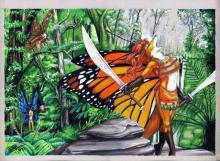 A Whisper of Wings
A Whisper of Wings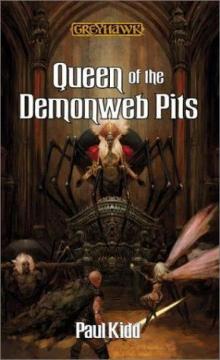 Queen of the Demonweb Pits (greyhawk)
Queen of the Demonweb Pits (greyhawk)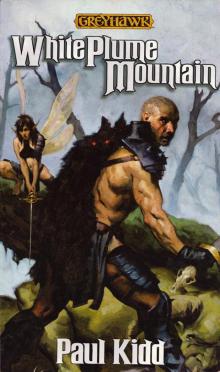 White Plume Mountain (greyhawk)
White Plume Mountain (greyhawk)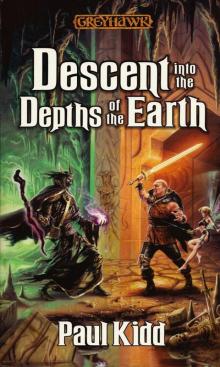 Descent into the Depths of the Earth (greyhawk)
Descent into the Depths of the Earth (greyhawk)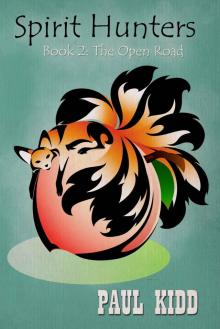 The Open Road
The Open Road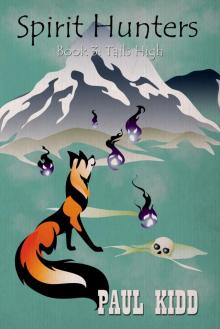 Tails High
Tails High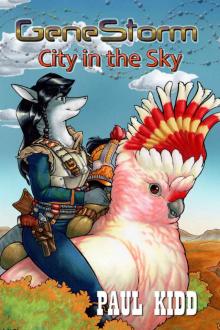 GeneStorm: City in the Sky
GeneStorm: City in the Sky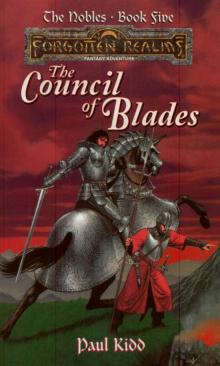 The Council of Blades n-5
The Council of Blades n-5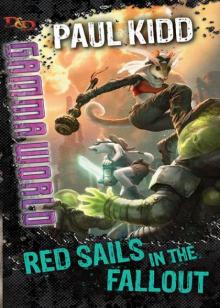 gamma world Red Sails in the Fallout
gamma world Red Sails in the Fallout